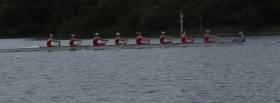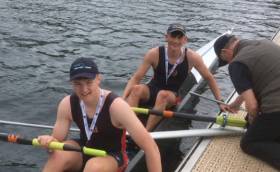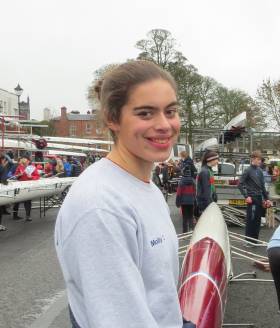Displaying items by tag: Coleraine GS
#Rowing: Bann won the women's junior 18 eights with some style at Athlone Regatta today. In a battle of Northern Ireland clubs, the women in red and white were two lengths ahead of Enniskillen, with Coleraine GS third.
The women's junior 18 fours came late in the day and was a terrific battle. Commercial produced a cracking finish to win by a length from Enniskillen, with Bann third.
Coleraine's Molly Curry was a convincing winner of the women's junior 18 single, while Brian Colsh of Sligo was the men's junior sculling winner.
Galway's St Joseph's won the men's junior 18 eight, while Bann's good day included a win in the men's junior 18 four.
Enniskillen in the Medals at National Schools Regatta
#Rowing: Enniskillen’s Sam Balcombe and Peter Murphy took a fine third place in the men’s Championship Pair at the National Schools Regatta at Dorney Lake today.
On Saturday, Enniskillen had won gold in the Junior 16 Girls coxed four by a big margin.
Ryan Spelman of St Michael’s took his place in the A Final of the Championship Single Sculls, and finished well to challenge the leaders. He took fifth.
Coleraine Grammar School also took fifth in the final of the Junior 16 Girls Double.
Curry is Afloat Rower of the Month for February
#Rowing: The Afloat Rower of the Month for February is Molly Curry. In a set of weeks in which action on the water was severely limited because of windy weather, the Ireland trials at the National Rowing Centre were welcome – and of high quality. World Rowing Champions Paul O’Donovan and Sanita Puspure won in fine style, while the standard of junior rowing was notable. Curry, from Coleraine Grammar School, showed good form. She was the top woman junior in the time trial and went on to compete in the same 2,000 metre race as Puspure.
Rower of the Month awards: The judging panel is made up of Liam Gorman, rowing correspondent of The Irish Times and David O'Brien, Editor of Afloat magazine. Monthly awards for achievements during the year will appear on afloat.ie. Keep a monthly eye on progress and watch our 2019 champions list grow.
O'Donovans Burn Off Rivals at Ireland Rowing Trials
#Rowing: Paul O’Donovan and Gary O’Donovan produced the best performance of the first Saturday session of the Ireland trials. The lightweight double beat their Skibbereen under-23 rivals Jake and Fintan McCarthy by 8.4 seconds and a heavyweight double of Ronan Byrne (UCC) and Philip Doyle (Queen’s) by 3.9 seconds.
The heavyweight pair of Shane O’Driscoll and Mark O’Donovan also put their challengers firmly behind them. They raced at a high rate in the good conditions and beat Patrick Boomer and Andy Harrington by 6.6 seconds.
Three senior women’s crews performed well. Single sculler Sanita Puspure and the heavyweight and lightweight doubles of Monika Dukarska and Aileen Crowley and Denise Walsh and Margaret Cremen all looked on form as the selectors decide on which crews to send to the World Cup Regatta in Belgrade.
In the junior trials, Annie O’Donoghue and Ciara Moynihan of Workmen’s won a fine doubles race. Aoibhinn Keating of Skibbereen and Ciara Browne of Workmen’s were their closest rivals, but Mollie Curry of Coleraine GS and Eimear Crowley of Kenmare contended at the finish and were just 1.4 seconds off the winners.
#Rowing: Portadown Regatta enjoyed almost perfect conditions today. A packed programme was run in bright, warm sunshine and on flat water. RBAI beat the host club in one of the top events of the day, the men’s junior 18 eights final, reversing the decision of last year.
Shauna Murtagh of Carrick-on-Shannon beat Kate Crawford of Portadown in the women’s junior 18 single sculls – a first win in a regatta for the 16-year-old daughter of Ireland great Frances Cryan.
The men’s junior 18 single was won by Hugh Moore of Coleraine Grammar School.































































